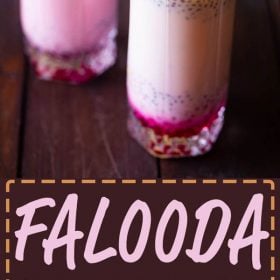Falooda (also spelled Faluda) is a popular Indian summer dessert drink made with various layered elements like milk, sweet basil seeds (sabja seeds), jelly, vermicelli, ice cream, nuts, and rose syrup. Served both in restaurants and even on the streets in many Indian cities, this popular Indian dessert is perfect for warmer weather and outdoor dining. Learn to make this refreshing Falooda recipe with my video and step by step photos.
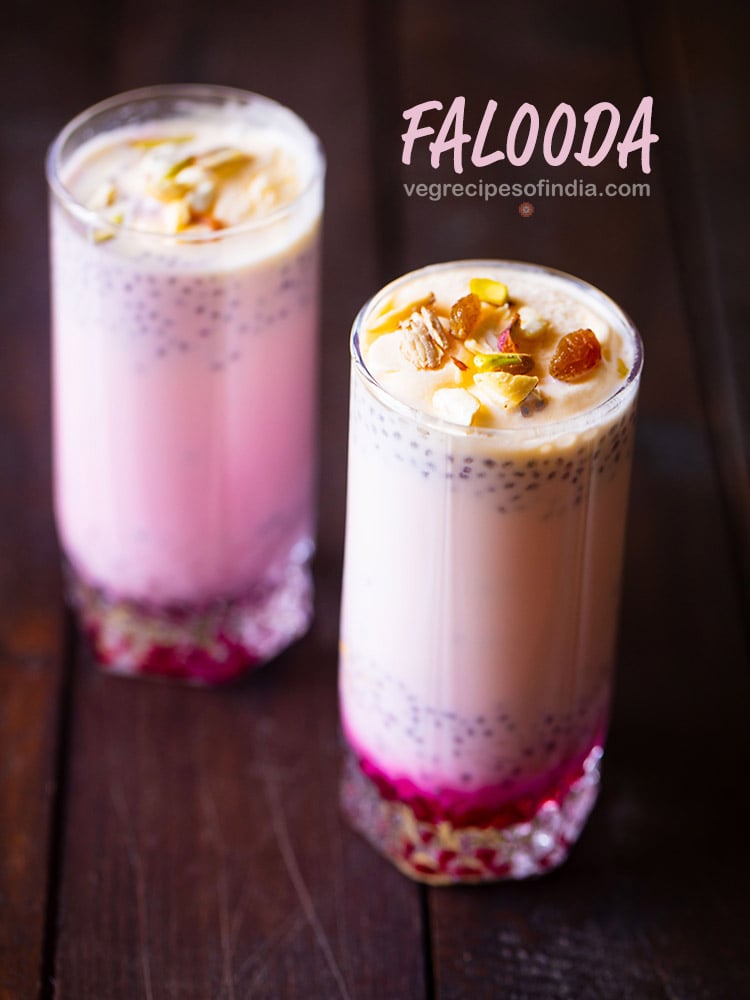
What is Falooda
As I already mentioned in the beginning, a falooda is a cross between a dessert and drink. Hence, I like to call it as ‘dessert drink’ only. You can sip on the lovely compilation or dig through the layers and savor the decadent flavors. So, both a spoon and a straw are quite mandatory with the falooda.
A bit about its origin: The Indian ‘falooda’ comes from its Persian counterpart ‘faloodeh.’ It reached India between 16-18th century with the many Central Asian dynasties invading and settling here. Then, the Mughal Empire had a great hand in developing it in its present form.
Sometimes called as ‘faluda,’ it is as popular in Sri Lanka, Bangladesh and Pakistan as it is in India, especially in Mumbai, Pune, Delhi and Gurgaon. Not to forget, I too, quite love the whole falooda deal! This falooda recipe is my most favorite.
Although, making a falooda is an easy task, still it does take patience to bring all the elements together. You’ve got to keep adding one ingredient layer after the other till your serving glass or jar is full to the brim.
The most common elements of almost all types of falooda are sabja seeds (sweet basil seeds), falooda sev (thin cornstarch vermicelli), jelly (optional), milk, Ice Cream, nuts and dry fruits. Then, it depends from individual to individual as to what additional flavors they want to add to give a customized touch.
Ingredients You Need
Falooda is not only delicious but also very cooling for the summers. A few ingredients in it are cooling in nature.
- Sabja seeds: These tiny black seeds are sweet basil seeds and are also known as tukmaria seeds. Sabja seeds are cooling to the body. Swap chia seeds with sweet basil seeds if you do not get them.
- Rose syrup: It is a thick red colored sweet syrup made from roses, sugar and cooling as well. For an authentic Faluda, I suggest to make it with rose syrup. It adds a lovely floral aroma and a pink color to the drink. It is the only sweetener you need in this falooda recipe.
- Falooda sev – In Hindi language, the word ‘sev’ means vermicelli and in an authentic falooda recipe, vermicelli made from corn starch or arrowroot flour is added. That being said, for healthier options you can use thin whole wheat vermicelli or rice vermicelli.
- Jelly or Jello – An optional element is jelly (jello). Add any fruity flavored vegetarian or vegan jelly like strawberry, raspberry, orange or mango jelly.
- Milk: Make it with dairy or a vegan milk. The milk must be cold or chilled.
- Nuts and dry fruits: Glazed cherries, tutti frutti, cashews, almonds, pistachios are some of the ingredients that you can add.
- Ice cream: Though vanilla ice cream is preferred choice of ice cream, other ice cream varieties like mango, orange, pistachio, butterscotch, chocolate also work well.
Note that you will find sweet basil seeds, falooda vermicelli and rose syrup in an Indian or Asian store or on amazon if you live outside South Asia.
Step-by-Step Guide
How to Make Falooda Recipe
Soak Sweet Basil Seeds
1. First take ½ tablespoon sabja seeds (sweet basil seeds) in a bowl. You can check for some husks or stones if any and remove them.
If you do not have sweet basil seeds, substitute chia seeds.
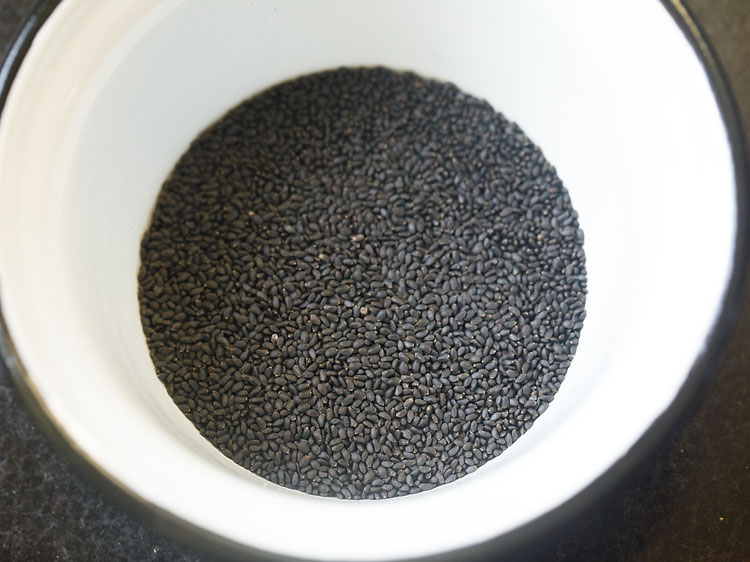
2. Then add water and stir.
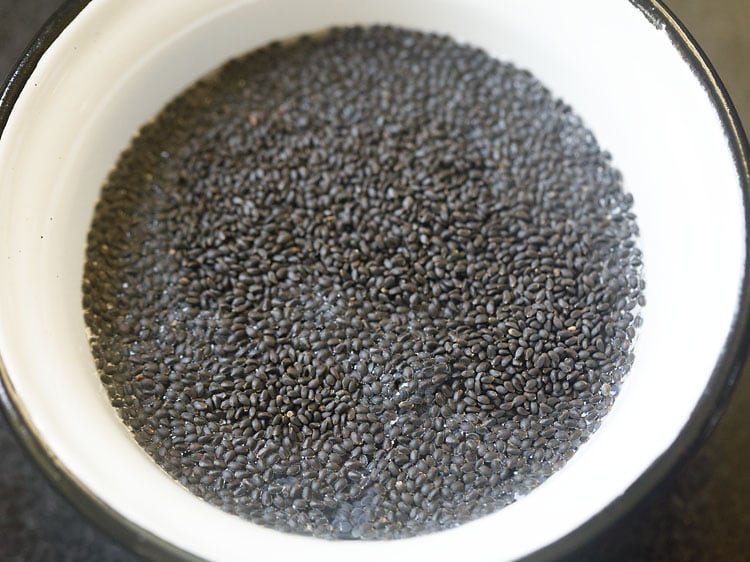
3. Soak the sabja seeds in the water for about 20 to 30 mins.
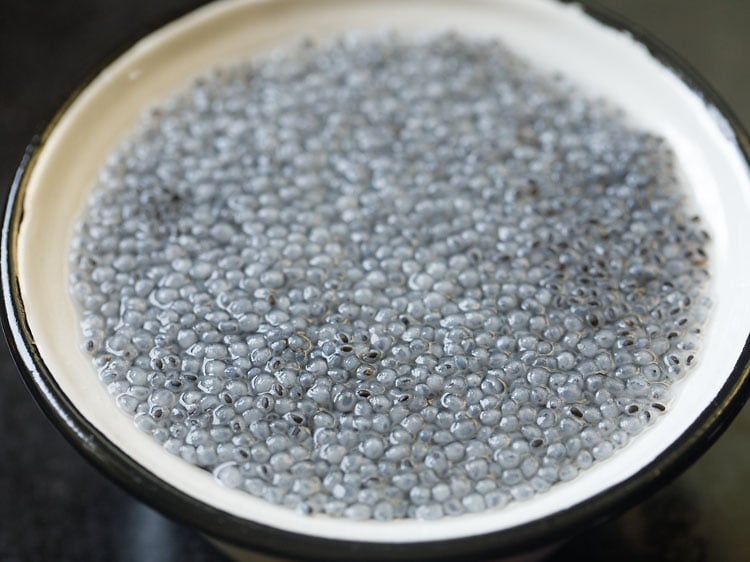
4. After 30 minutes, you will see the sabja seeds fully soaked and will look gelatinous.
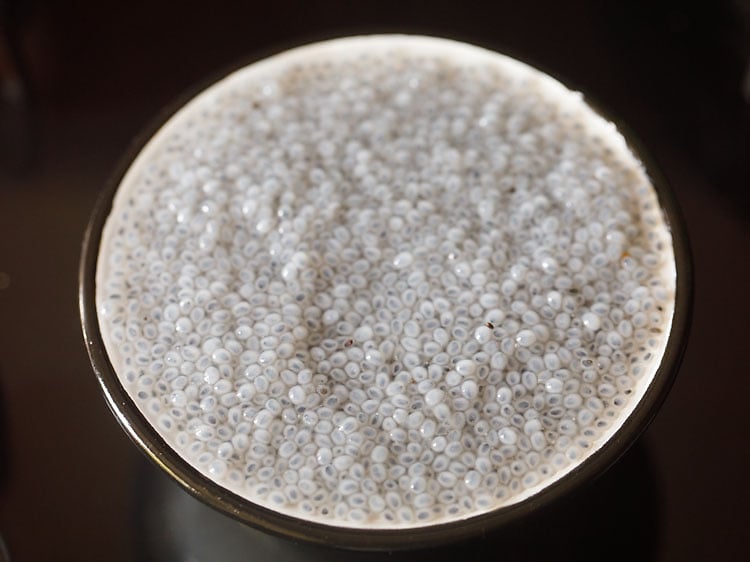
5. Using a fine strainer drain the extra water from the sabja seeds. Cover and keep the soaked sabja seeds aside.
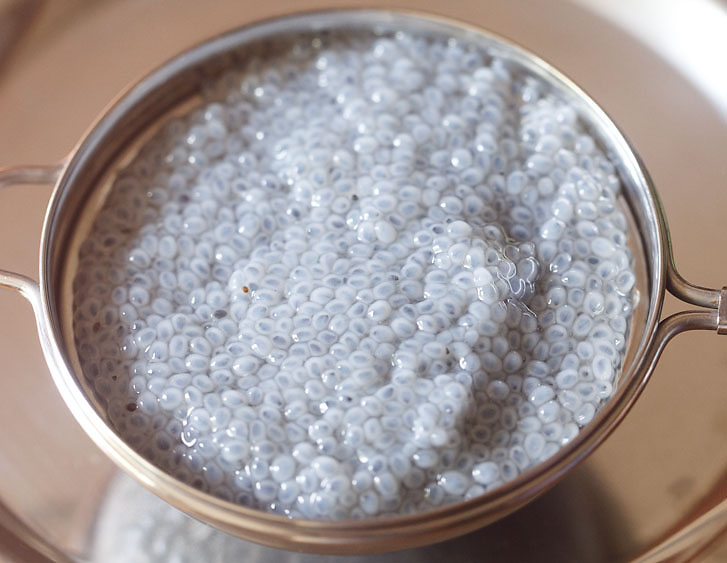
Cook Falooda Sev and Prep Nuts
6. Meanwhile, begin to prepare the faluda sev according to package instructions. Some require just soaking the falooda sev in warm water.
I had to cook them in boiling water much like noodles, so I heated up 1.5 cups water and let it come to a boil.
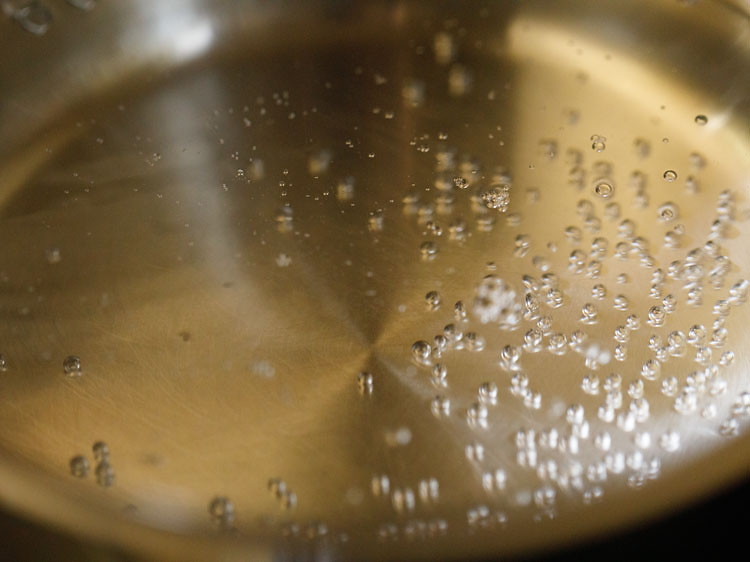
7. Then added 5 tablespoons sev (roughly ⅓ cup). If the faluda sev are long, then just break or chop them before cooking.
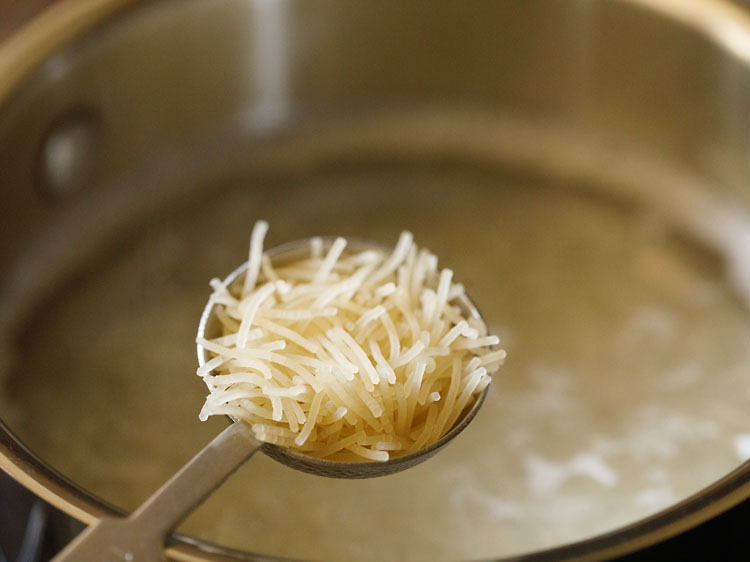
8. Boil in the water on medium heat until the vermicelli have softened.
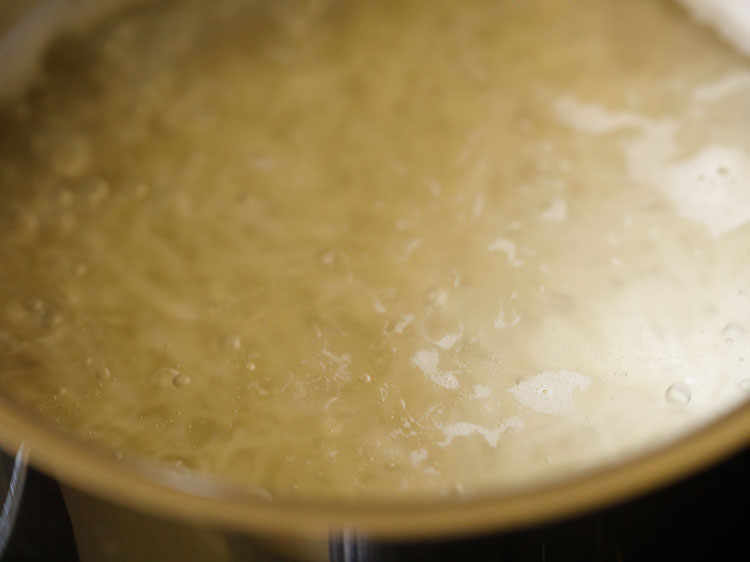
9. In the below photo you see that the vermicelli have softened and cooked well.
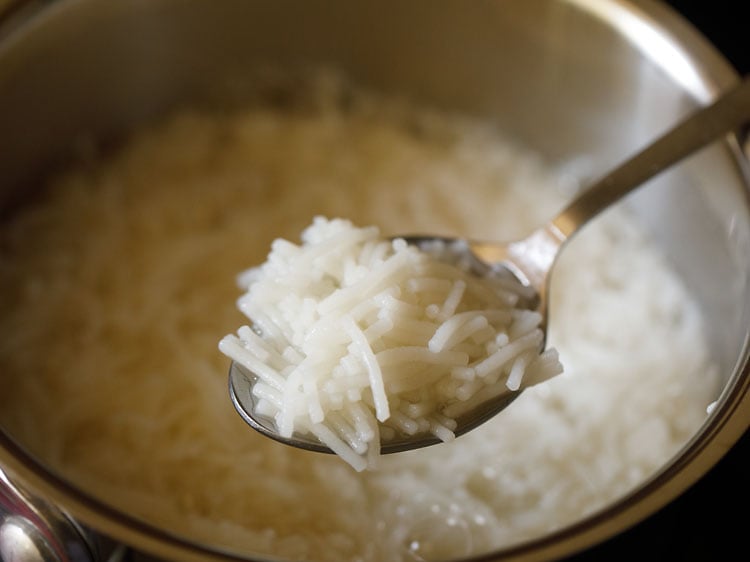
10. Once cooked, then strain them and drain the water. Rinse them in running water and set aside.
Rinsing removes the extra starch from them. Cover and let the faluda sev cool completely at room temperature.
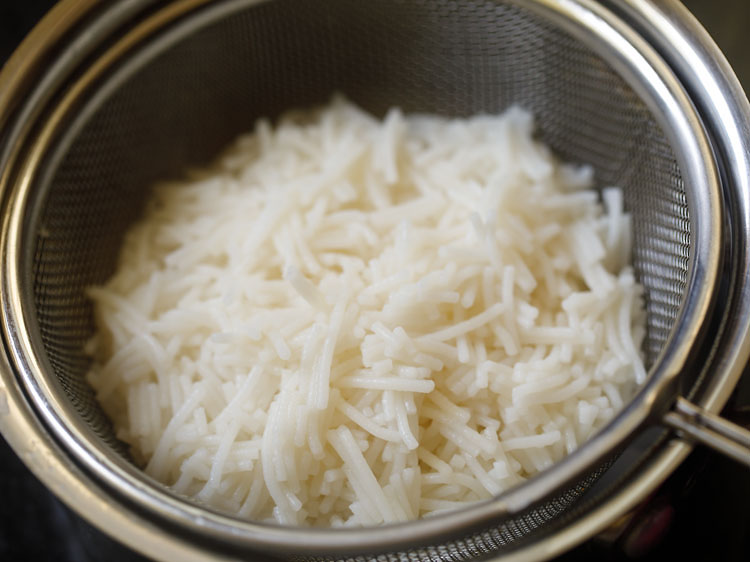
11. Chop the nuts that you will be adding. I have added some cashews, almonds and pistachios. Raisins can be kept whole.
You can rinse the nuts and raisins in water if you want, before chopping them. That’s what I do always when using nuts and dry fruits.
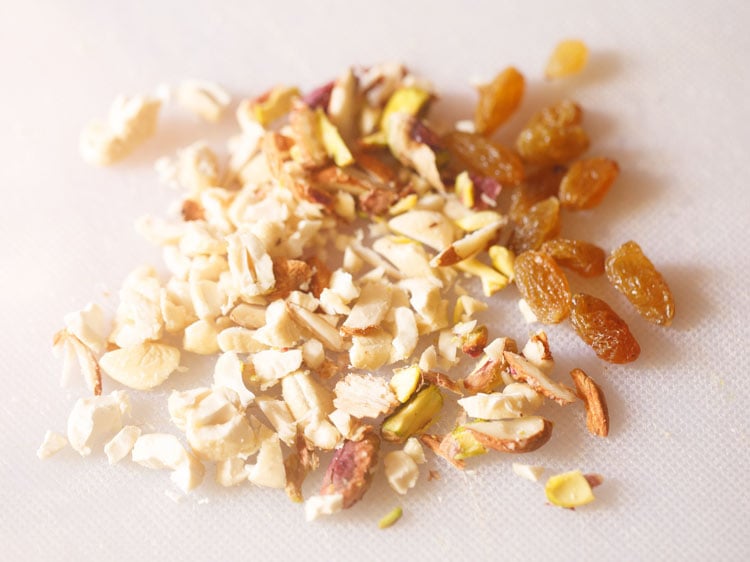
Make Falooda Ice Cream
12. In about 4 tall serving glasses each, add the rose syrup first. You can add about 1.5 to 2 tablespoons rose syrup depending on the sweetness preferred as well as the size of the glass.
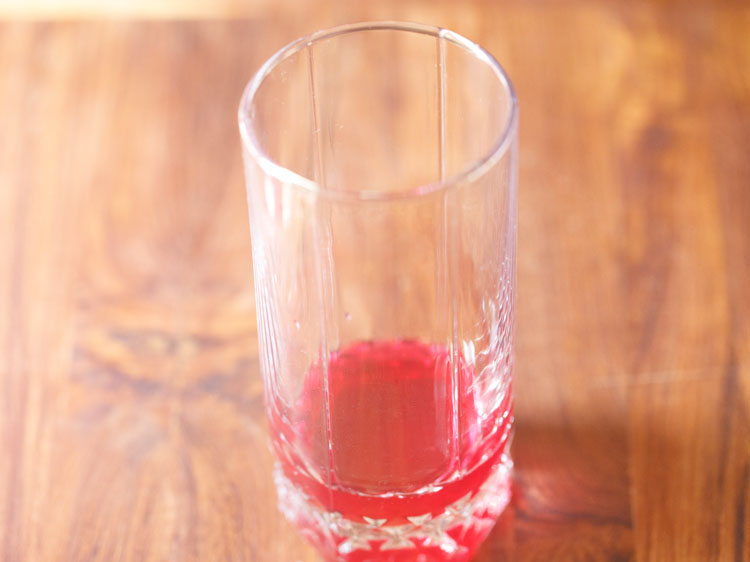
13. Then add 2 tablespoons of the soaked sabja seeds.
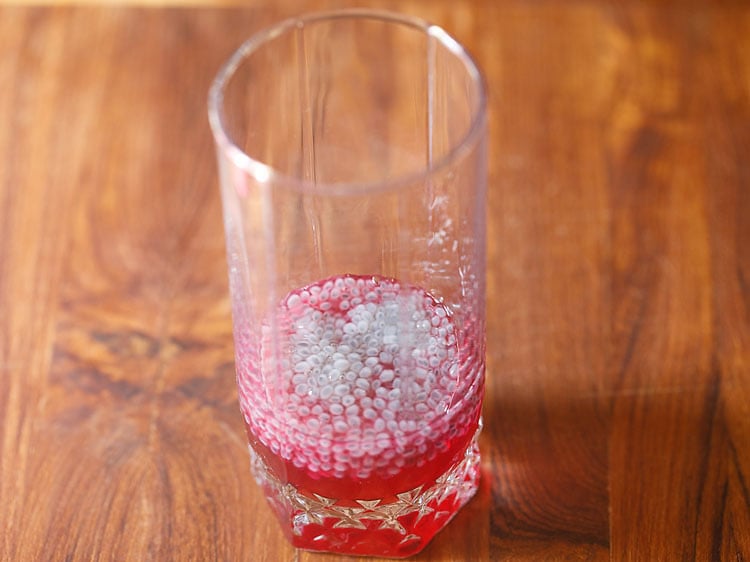
14. Add 2 to 3 tablespoons of the falooda sev. After adding the sev, you can add some cubes or chunks of jelly/jello if you are using it.
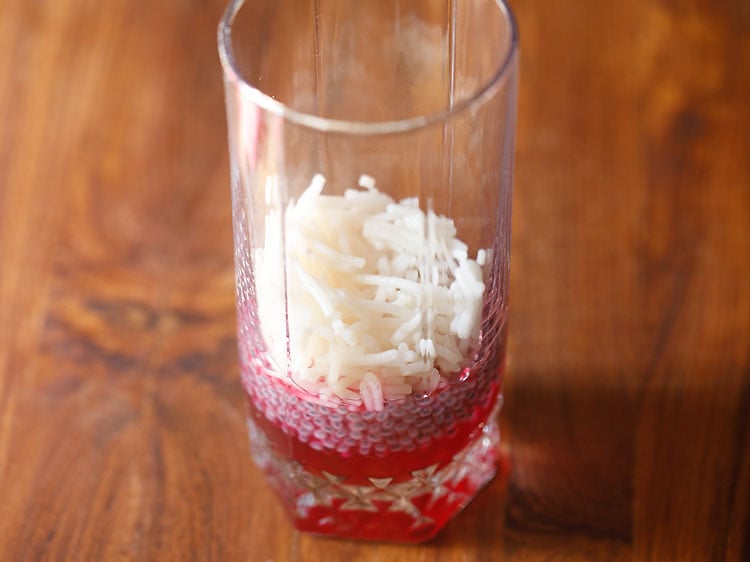
15. Add about 1 cup cold or chilled milk in a slow stream taking care that the milk does not mix with the rose syrup and the sabja seeds.
The layers have to be visible and that is what makes this drink visually appealing.
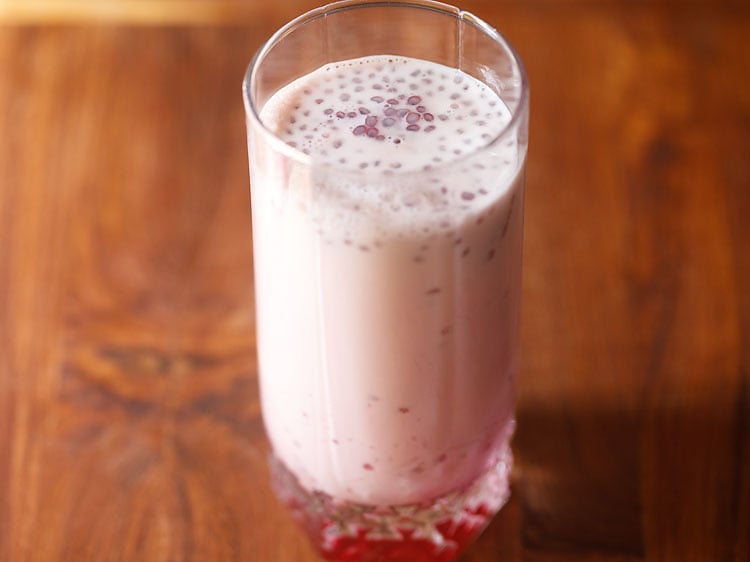
16. Finally add a scoop of vanilla ice cream or pista ice cream or mango ice cream or malai kulfi.
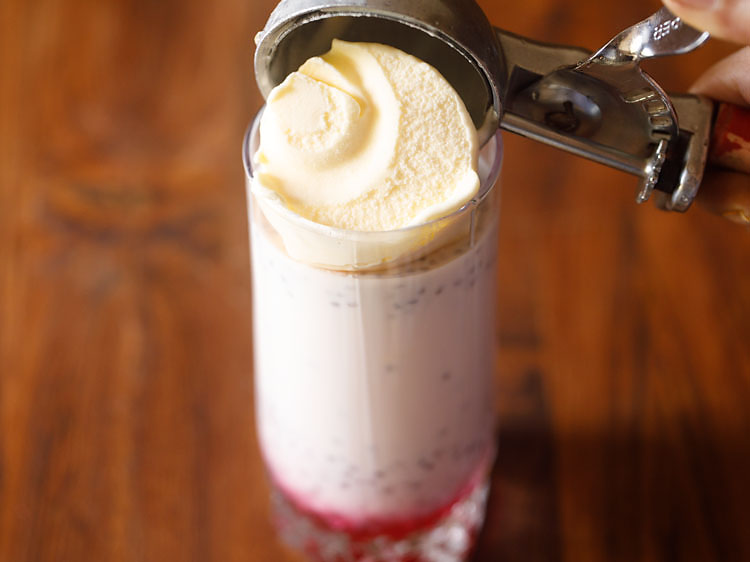
17. Top with sliced pistachios, golden raisins and sliced almonds. For a bright pop of color, you can decorate with a few glazed cherries or tutti-frutti.
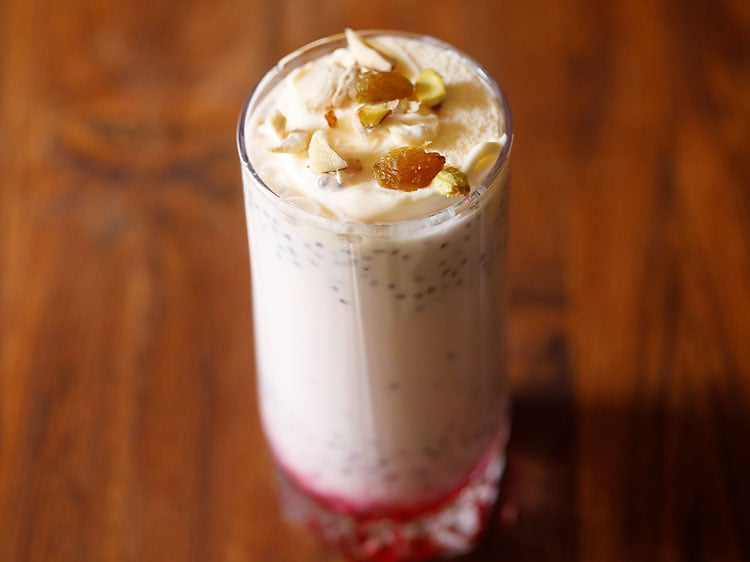
18. Serve falooda ice cream immediately. While drinking falooda, with a spoon mix the rose syrup settled at the bottom with the milk and then drink and eat the vermicelli, sabja seeds and nuts.
Mixing the rose syrup makes the milk sweet as well as the ice cream also helps in sweetening the milk.
Tip: Keep the remaining soaked basil seeds and cooked sev in the refrigerator for 2 to 3 days. Add soaked sabja seeds to lemon-based drinks, rose-based drinks, any sherbet or even just plain water or chilled milk.
Love this falooda recipe? Try my variation of Kulfi Falooda, in which Kulfi (frozen Indian dessert) is served with cooked vermicelli and soaked basil seeds.
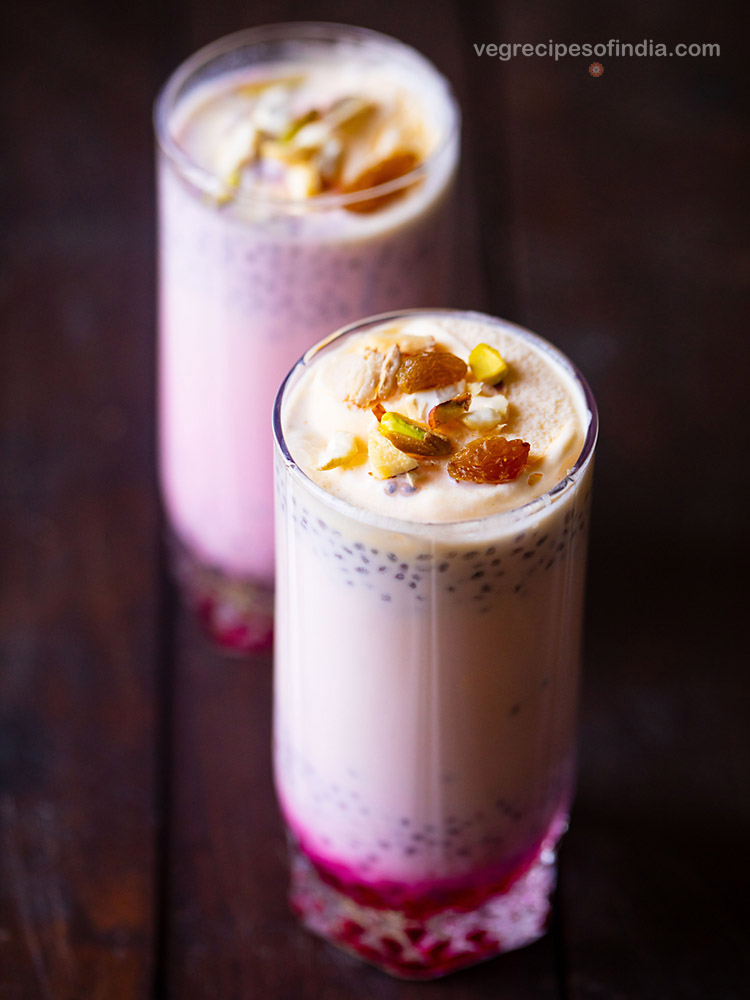
Expert Tips
- Sweeteners: There is no need to add any sugar as the sweetness of the rose syrup is enough to make the faluda sweet. But as you prefer, you can add sugar to the milk.
- Ice cream: For the ice cream, you can easily use any variety of ice cream or even kulfi. Some ice cream variants which taste good in a falooda are vanilla, mango, chocolate, pistachios, almond, cashew-raisin, strawberry and butterscotch.
- Vegan options: Make this recipe vegan by using cold Almond Milk and a plant based ice cream. Also add agar agar jelly or vegan jello.
- Vermicelli: If you do not have falooda sev, substitute thin whole wheat vermicelli or thin rice vermicelli instead.
- Scaling: The recipe can be halved for smaller servings or made into a big batch easily.
- Jelly: I have not included jelly. If you prefer add some vegetarian or vegan jelly chunks into the falooda. You need to make and set the jelly a day earlier before you add them in your faluda.
Falooda Variations
- Fruity flavors: Add chopped fruits, like mangoes, strawberries, apple. I have earlier shared Mango Falooda which makes use of fresh sweet mango pulp. But only add fruits that are compatible with milk. Fruit purees or dates puree can also be added.
- Chocolate falooda: Make the chocolate variant by using chocolate syrup or chocolate sauce.
- Dry fruits falooda: This variation can be made by making a paste of soaked dry fruits and nuts and adding it to milk and then topping with more nuts.
- Kesar Pista falooda: A popular faluda variation is made with saffron (kesar) and pista (pistachios).
FAQs
Both homemade rose syrup and store-brought rose syrup work well. In the absence of rose syrup, rose water can be used.
You can even use rooh afza instead of rose syrup. It is the rose fragrance and the pink color that makes the drink refreshing and appealing.
Sabja seeds are sweet basil seeds. These small black seeds are also known as tukmaria seeds. They are similar to chia seeds, but not the same. In the absence of sabja seeds, you can use chia seeds.
For healthier options, you can use whole wheat vermicelli or rice vermicelli.
Strawberry, raspberry or rose-flavored jelly all work well with this recipe. In fact, you can use any fruit-based jelly.
Vanilla ice cream is usually added in a falooda. But even other ice cream types, like mango ice cream, pistachio ice cream, butterscotch ice cream, chocolate ice cream, also work well. Even kulfi like Malai Kulfi or Mango Kulfi can be added.
More Delicious Drinks to Try!
Please be sure to rate the recipe in the recipe card or leave a comment below if you have made it. For more veetarian inspirations, Sign Up for my emails or follow me on Instagram, Youtube, Facebook, Pinterest or Twitter.
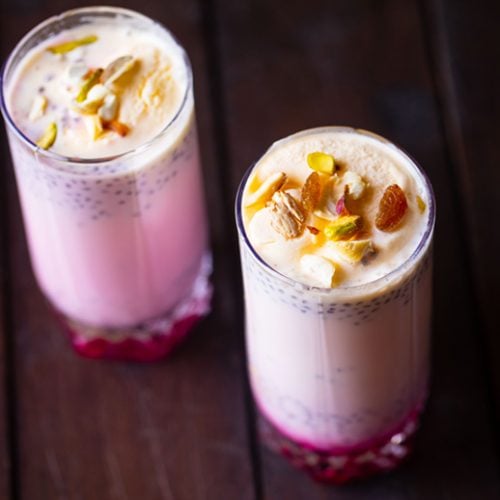
Falooda Recipe with Ice Cream | Faluda Recipe
Falooda ice cream is a layered summer dessert drink made with milk, rose syrup, sabja seeds (sweet basil seeds), falooda sev (thin vermicelli), nuts, raisins and ice cream. Faluda is a popular Indian summer drink and easy to make.
Prep Time 30 mins
Cook Time 15 mins
Total Time 45 mins
For soaking sweet basil seeds
For making faluda (4 servings)
Prevent your screen from going dark while making the recipe
Preparation
Soak sabja seeds in water for about 20 to 30 mins. Once they swell using a strainer drain the extra water and set the soaked seeds aside.
Prepare the falooda sev according to package instructions.
Some require just soaking the falooda sev in warm water. Or you can cook them in hot water until softened.
Boil water on medium to high heat. Add the falooda sev or your preferred choice of vermicelli. If the faluda sev are long, then just break or chop them prior to cooking.
Cook according to package instructions or until softened.
Once cooked, using strainer or colander, drain the extra water. Then rinse the cooked falooda sev in fresh water. Drain the water again. Keep covered aside till they are cooled completely at room temperature.
Chop the nuts and set aside.
Making falooda ice cream
In 4 tall glasses each, add 1.5 to 2 tablespoons rose syrup. Depending upon the sweetness preferred and the size of the glass add less or more of the rose syrup.
Then add 2 tablespoons soaked sabja seeds.
Add 2 to 3 tablespoons of the faluda sev.
In a slow stream, pour about 1 cup milk.
Then top with one scoop of vanilla ice cream.
Garnish with a few raisins, sliced pistachios, almonds or cashews. For a bright pop of color, you can decorate with a few glazed cherries or tutti-frutti. Prepare the remaining falooda drinks in the same way.
Serve the falooda straight away. While drinking, with a spoon mix the rose syrup settled at the bottom with the milk and then drink as you eat the vermicelli, sabja seeds and nuts.
- Scaling: This falooda recipe can be doubled and tripled.
- Sweetener: No need to any sugar or any other sweetener as the rose syrup itself is very sweet. You can add less or more of the rose syrup according to your taste buds or the size of the glass used to assemble the layers of falooda.
- Jelly: You can skip adding jelly or jello in the recipe as it is an optional ingredient.
- Nuts: The dry fruits and nuts can be of your choice.
- Vegan option: Use almond milk and vegan ice cream for a vegan falooda. You can add agar agar jelly or vegan jello.
- Leftovers: The remaining soaked basil seeds and sev can be kept in the refrigerator and stays well for a couple of days. Soaked sabja seeds can be added to lemon based drinks, rose-based drinks, any sharbat or even just plain water or chilled milk.
Nutrition Facts
Falooda Recipe with Ice Cream | Faluda Recipe
Amount Per Serving
Calories 345 Calories from Fat 117
% Daily Value*
Fat 13g20%
Saturated Fat 5g31%
Trans Fat 1g
Cholesterol 25mg8%
Sodium 148mg6%
Potassium 428mg12%
Carbohydrates 51g17%
Fiber 2g8%
Sugar 33g37%
Protein 10g20%
Vitamin A 407IU8%
Vitamin B1 (Thiamine) 1mg67%
Vitamin B2 (Riboflavin) 1mg59%
Vitamin B3 (Niacin) 1mg5%
Vitamin B6 1mg50%
Vitamin B12 1µg17%
Vitamin C 1mg1%
Vitamin D 3µg20%
Vitamin E 1mg7%
Vitamin K 2µg2%
Calcium 306mg31%
Vitamin B9 (Folate) 17µg4%
Iron 1mg6%
Magnesium 55mg14%
Phosphorus 296mg30%
Zinc 1mg7%
* Percent Daily Values are based on a 2000 calorie diet.
This Falooda recipe post from the archives first published in May 2014 has been updated and republished on March 2023.
Source link


